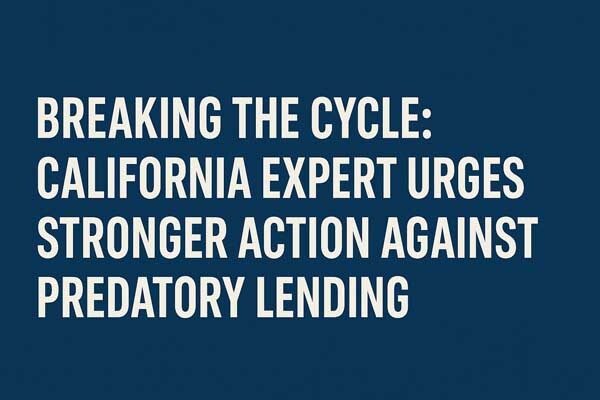 News Staff
News Staff![]() -
September 29, 2025 -
Business
Rob Bonta
Consumer Financial Protection Bureau (CFPB).
-
424 views -
0 Comments -
0 Likes -
0 Reviews
-
September 29, 2025 -
Business
Rob Bonta
Consumer Financial Protection Bureau (CFPB).
-
424 views -
0 Comments -
0 Likes -
0 Reviews

DLNews Business:
Breaking the Cycle: California Expert Urges Stronger Action Against Predatory Lending
California’s financial watchdogs are sounding the alarm as protections for vulnerable borrowers come under fire. Attorney General Rob Bonta, alongside colleagues from 19 other states, has challenged the Trump administration’s move to scale back oversight of financial companies, particularly payday lenders, through the Consumer Financial Protection Bureau (CFPB).
For years, the CFPB stood as the federal agency tasked with reining in abusive financial practices. But staffing cuts and budget reductions have left it weakened, with fewer tools to confront lenders who charge interest rates that spiral into triple digits. The result has been a green light for payday lenders to flourish, often in low-income communities of color where families are most at risk.
Ellen Harnick, executive vice president and director of state policy at the Oakland-based Center for Responsible Lending, warned that the CFPB’s retreat is opening the door for exploitation. “The CFPB, under the new administration, have specifically said they are going to withdraw focus from nonbank lenders. That is especially harmful to the communities that we seek to serve who are really targeted by those lenders,” she said.
California law still permits payday lenders to charge $15 per $100 loaned, which translates into an eye-popping 460% annual interest rate. Coupled with repayment periods as short as two weeks, borrowers often find themselves trapped in an endless cycle of debt. The rise of online payday loan apps has only widened access to these high-cost products.
Some states have successfully fought back. North Carolina banned payday lending in 2001, a model consumer advocates hope California will strengthen. Meanwhile, community development financial institutions (CDFIs) are stepping into the gap. Unlike payday lenders, CDFIs are designed to help families build wealth by offering access to mortgages, homebuyer assistance programs, and even clean-energy financing. These institutions, however, have been strained as millions in federal grants meant for them were withheld under the Trump administration, sparking ongoing legal disputes.
Still, experts like Harnick stress that the path forward lies in redirecting borrowers away from high-cost payday loans and toward trusted, community-based solutions. “These loans are designed to create their own demand,” she said. “The extreme cost and short repayment period drive borrowers to borrow again and again, just to keep up.”
For businesses and communities alike, the message is clear: protecting consumer trust is more than a regulatory issue—it is an economic imperative. Without robust oversight, the cost of predatory lending ripples outward, stifling long-term growth, draining local economies, and undercutting pathways to financial stability.

At Desert Local News, connections are everything. We're not just another social networking platform—we're a lively hub where people from all walks of life come together to share stories, spark ideas, and grow together. Here, creativity flourishes, communities grow stronger, and conversations spark global awareness.